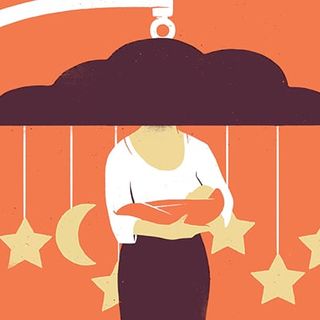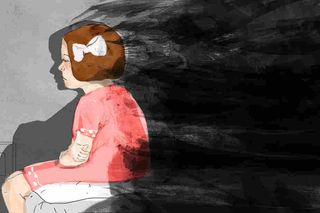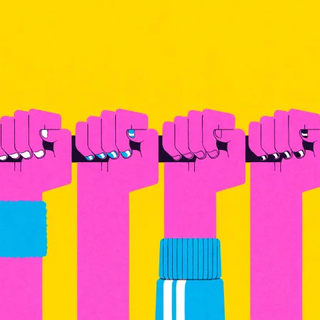
Shame, Family Secrecy Lead to Mishandling of Child Sexual Abuse
Parents need to deal with child sexual abuse in a more child-centric manner.

I was standing on a balcony, using one arm to hold my younger sister, and the other to point out pretty lights to make her giggle. My uncle, whose house we had come to for dinner, came and stood next to me. Inside, his family and mine ate treats his wife had lovingly cooked for us in the living room. He put his arm across my waist, ran his palms up my body, squeezed my right breast and proceeded to sneak his palm under my shirt to caress my skin. I was 13.
I remembered excusing myself with my little sister, joining the rest of my family in the living room. My first instinct was to act like nothing had happened, like he probably didn’t do what I think he did — so I shut up.
It took me weeks to tell my mother, who, while being enraged on my behalf, didn’t know what other recourse to take. My grandmother agreed. He had kids, a wife, a home, for which he was the sole breadwinner. It wasn’t that bad and so, we as a family would keep quiet and try to maintain our distance.
It’s been years since it happened, and I have gone over this approach multiple times. I still don’t know what else could have been done. I have started to whisper in my family members’ ears to keep their children away from this man. But I wonder how many families I am not able to reach, how many girls he could grope under the pretense of watching pretty lights.
Such a passive response, concludes “Breaking The Silence,” a Human Rights Watch report, is a major impediment to children recovering from child sexual abuse.
*
Child sexual abuse is once again in mainstream discourse, with the recent release of the HBO documentary, Leaving Neverland, which revisits the child sexual abuse of Wade Robson and James Safechuck at the hands of Michael Jackson. In a one-hour special on her network OWN, Oprah Winfrey hosted the two men, and delivered a call to action, hoping to use the documentary as a launching point for creating awareness around rampant child sexual abuse.
“For me, this moment transcends Michael Jackson. It is much bigger than any one person,” said Winfrey, who is a child sexual abuse survivor herself. “This is a moment in time that allows us to see this societal corruption; it’s like a scourge on humanity. And it’s happening right now; it’s happening in families; we know it’s happening in churches, and in schools and sports teams everywhere.
So, if it gets you, our audience, to see how it happens then some good will have come of it.”
Child sexual abuse is “the involvement of a child in sexual activity that he or she does not fully comprehend and is unable to give informed consent to, or for which the child is not developmentally prepared, or else that violate the laws or social taboos of society,” according to the World Health Organization. It can range from sexual groping, similar to my experience, to molestation and child rape.
Nearly 42 percent of Indian girls have experienced sexual violence before their teens, according to a 12-yearsurvey by the United Nations International Children Education Fund that concluded in 2013. Another study of India shows that “for every 155th minute a child, less than 16 years, is raped; for every 13th hour a child under 10, and one in every 10 children [are] sexually abused at any point of time,” making India the country with the world’s highest rate of child sex abuse cases.
These numbers are most likely conservative, as a majority of cases go underreported in India, either by children, or by their guardians. Parents “might not wish to confront a relative or risk attracting social stigma to the family,” Human Rights Watch concludes.
“Parents find it very difficult to accept that such a thing has happened to their child,” according to Rajani Nair, program officer for counselling at Society for Nutrition, Education and Health Action, or SNEHA. “If the abuser is a family member or from the same community, there is a lot of social pressure that prevents them from taking further action.”
Related on The Swaddle:
The Effects of Sexual Harassment on Teens
The child is often not believed when they speak up. Even when they are, family members will discourage them from filing a police complaint, according to Human Rights Watch; members of the family and community will often handle the allegation “discreetly” and “unofficially.” Even when a mother would confront a family member — say, an in-law — of abuse, she would likely be thrown out of the house, according to same report.
*
As a result of the trauma and stress, the child starts to stay quiet or aloof, Nair said. If not believed, they suffer from guilt and start considering the sexual abuse as their own fault, which leads to feelings of rejection, depression and potentially suicidal ideation, she added.
The tight-knit families of India play a “very important” role in how parents deal with child sexual abuse, Nair said. There is high pressure to suppress the case, which often leads to the child turning hostile, she added.
Other effects of mishandling child sexual abuse include “mental health problems [such as] depression, anxiety, substance abuse, post-traumatic stress; [and] relational challenges regarding sexual health, intimacy, and increased risk for sexual assault and domestic violence; and spiritual concerns,” according to “Sexual Abuse of Children and Youth in India: An Anthropological Perspective.”
“It is often better not to tell, than to tell and not be helped,” Anuja Gupta, founder of Recovering and Healing From Incest (RAHI) told Human Rights Watch, adding that children find ways to live with the abuse in the face of lack of recourse. “If they do tell someone and are told to shut up, and are not believed, and nothing happens, you’re adding two or three layers of trauma on top of the abuse,” she added, stressing the importance of training caretakers in appropriate responses.
*
As a counselor, Nair often helps parents deal with their child’s sexual abuse.
Parents sometimes blame the child, especially in cases when their child is pregnant and needs to undergo a medical termination of pregnancy, she said. The most important method of dealing with the abuse is implementing “sensitivity” in all interactions, she added. In cases where the abuser is a family member, it is counselled that the child be taken out of their surrounding, either to a shelter home or to another safe place.
There also needs to be greater awareness created for the Protection of Children From Sexual Offences Act (POCSO) 2012, which makes it mandatory for people aware of child sexual abuse to report it, she added. If a person fails to do so, they can be imprisoned for six months or be subject to a fine. A study on the implementation of the POCSO Act,
conducted by Prerana, an NGO working to protect children from sexual exploitation, showed a correlating rise in reported cases of child sexual abuse. The reasons given ranged from greater social awareness about child sexual abuse, to the act’s expanded definition of abuse, according to the study.
Related on The Swaddle:
How to Protect Kids From Sexual Abuse
While dealing with cases of child sex abuse, it is imperative that parents are counseled about the severity of the crime, and the effects it can have on the child, Nair said. They also need to be taught to listen to their child and acknowledge the child’s needs and wants, she added.
While each case of child sexual abuse can vary greatly from another, Dr. Manjeer Mukherjee, senior adviser of programs at child care agency Arpan, listed some common themes of approach parents can follow:
“The first step of intervention is to respond to the child calmly at the time of disclosure. The initial response needs to be positive and supportive where the child is believed and help is provided,” she said. “By demonstrating that we believe the child, we can convey our empathy.”
The second step is to make sure there is no future harm to the child, she added. Thirdly, parents need to identify and involve a support system for the child. “The respondent cannot individually support the child so identifying and involving trusted adults [who can help] stop the abuse is very essential,” she said, adding that it is imperative to involve the child in this process.
*
On my birthday in January of this year, my grandmother came running to me, telling me the pedophilic uncle wanted to speak to me. She looked at me with concern, but continued to hold out the phone. “Happy Birthday, beta,” the voice on the other end said. “Thank you,” I replied.
I don’t blame my family for not being able to handle the sexual harassment I underwent as a child. Exhaustive talks in later years revealed they had undergone similar experiences in their youth, and the passive responses of the loved ones they chose to tell. They chose to respond to me in the only ways known to them, never having experienced a child-centric approach to handling sexual abuse.
While teaching the child to speak up, educating them about ‘good touch’ and ‘bad touch’ and inculcating sexual education in schools are ways to curb child sexual abuse in the future, it is imperative that parents also fulfill their responsibility, once the child has fulfilled theirs and spoken up.
This is not a problem that has a quick and easy solution. That’s all the more reason to stop sweeping it under the rug.
Rajvi Desai is The Swaddle's Culture Editor. After graduating from NYU as a Journalism and Politics major, she covered breaking news and politics in New York City, and dabbled in design and entertainment journalism. Back in the homeland, she's interested in tackling beauty, sports, politics and human rights in her gender-focused writing, while also co-managing The Swaddle Team's podcast, Respectfully Disagree.
Related


In Ultra‑Endurance Races, Women Are Quietly Leaving Men in Their Dust
